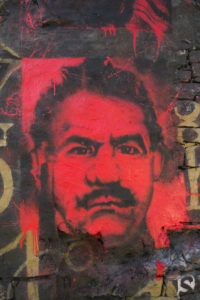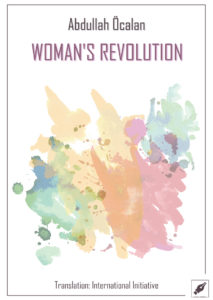 Abdullah Öcalan, also known as “Apo,” is a person whose name is at the heart of a controversy, globally, and particularly in Turkey about what he is – a thinker, a philosopher, a freedom fighter, a civil rights activist or a “terrorist.” Born on April 4, 1948, in Mardin Province of Southeast Turkey/North Kurdistan, Öcalan as a person either triggers emotions of nostalgia or deep hatred. Yet, Öcalan’s importance and significance cannot be ignored – both as the symbolic leader of the Kurds, but also as a decolonial thinker who, during the last 20 years whilst imprisoned on Imrali island in Turkey, has developed a unique social and political theory of colonialism and radical democracy.
Abdullah Öcalan, also known as “Apo,” is a person whose name is at the heart of a controversy, globally, and particularly in Turkey about what he is – a thinker, a philosopher, a freedom fighter, a civil rights activist or a “terrorist.” Born on April 4, 1948, in Mardin Province of Southeast Turkey/North Kurdistan, Öcalan as a person either triggers emotions of nostalgia or deep hatred. Yet, Öcalan’s importance and significance cannot be ignored – both as the symbolic leader of the Kurds, but also as a decolonial thinker who, during the last 20 years whilst imprisoned on Imrali island in Turkey, has developed a unique social and political theory of colonialism and radical democracy.
Öcalan’s writings appear all the more remarkable for their composition as legal statements to be read by his lawyers in Turkish courtrooms. Written whilst in solitary confinement with no access to a library, Öcalan’s writings often stretch to book length studies of praxis, the subject/object dualism, the capitalist regime of truth, and how this is tied to a history of slavery, as well as a wide ranging critique of Western metaphysics and colonialism. Öcalan’s political thought is influenced by Murray Bookchin, Michel Foucault, Hannah Arendt, Karl Marx and Friedrich Engels as well as feminist political theory and the myths of Ancient Mesopotamia.
Öcalan’s is the symbolic leader of the Kurdistan Worker’s Party (PKK), a militant left-wing nationalist movement, managing to maintain this role whilst in prison. He is the empty signifier of freedom, liberation and decolonization for Kurds, and his political project is one that can be classified as decolonial and as having a radical democratic aim. Crucial to Öcalan’s thought is a feminist politics in which he figures Women at the centre of his theory of democratic civilisation or freedom.
Central to the positive vision for the Kurds, the Middle East and the world is the separation of the concepts of nation and state, arguing for a democratic confederalism that presupposes a politics of dis-identifying with the state, with capitalism, and with patriarchy. Through these prison writings, “Apo” offers something of a “post-humanist” or ecological ontology, arguing that a democratic future requires an ongoing renegotiation with the colonial present and the possibility of politics without subjectivation.
 Öcalan’s work has undergone major transformation following his arrest in 1999. From his prison cell, Öcalan’s defence texts and ‘prison notes’ have illustrated his reshaped ideology as well as the PKK discourse, as these are seen as synonymous (Günes, 2011). Under Öcalan’s leadership the politics of the PKK has transitioned from what was in essence ‘a civil rights war fought in national liberation terms’ moving ‘to a national liberation war fought in civil rights terms’ premised largely upon a Marxist-Leninist ideology (Cavanaugh and Hughes, 2015).
Öcalan’s work has undergone major transformation following his arrest in 1999. From his prison cell, Öcalan’s defence texts and ‘prison notes’ have illustrated his reshaped ideology as well as the PKK discourse, as these are seen as synonymous (Günes, 2011). Under Öcalan’s leadership the politics of the PKK has transitioned from what was in essence ‘a civil rights war fought in national liberation terms’ moving ‘to a national liberation war fought in civil rights terms’ premised largely upon a Marxist-Leninist ideology (Cavanaugh and Hughes, 2015).
Öcalan’s work from 2000 onwards illustrates, however, a new political project in which he develops his own version of socialism, which is centred around democratic confederalism and democratic autonomy, presenting what is essentially a radical rethinking of democracy in its current form. Öcalan’s work has therefore changed importantly insofar as he has replaced state-building with society-building, and replaced the nation-state with confederalism premised upon radical democracy outside of the nation-state paradigm.
Consequently, democratic confederalism is a means through which ‘democratic self-government’ can function (Öcalan, 2008), and in practice this implies, according to Öcalan that it ‘builds on the self-government of local communities and is organized in the form of open councils, town councils, local parliaments and larger congresses. The citizens themselves are agents of this kind of self-government, not state-based authorities (Öcalan, 2008).’ This bottom-up system developed by Öcalan illustrates how we can do politics and how an alternative model of democracy that allows the power of people, rather than the state as capitalism and patriarchy, can enable a democracy which is radical and participatory within ‘boundaries of existing nation-states through federation and self-organisation’ (Öcalan, 2017a).
 In a short essay called ‘Liberating Life: Women’s Revolution’, Öcalan (2013) outlines the core tenets of his sociological/historico-philosophical writings. Öcalan’s fundamental claim is that ‘mainstream civilisation’, commences with the enslavement of ‘Woman’, through what he calls ‘Housewifisation’ (2013). As such, it is only through a ‘struggle against the foundations of this ruling system’ (2013), that not only women, but also men can achieve freedom, and slavery can be destroyed. Any liberation of life, for Öcalan, can only be achieved through a Woman’s revolution. In his own words: ‘If I am to be a freedom fighter, I cannot just ignore this: woman’s revolution is a revolution within a revolution’ (2013).
In a short essay called ‘Liberating Life: Women’s Revolution’, Öcalan (2013) outlines the core tenets of his sociological/historico-philosophical writings. Öcalan’s fundamental claim is that ‘mainstream civilisation’, commences with the enslavement of ‘Woman’, through what he calls ‘Housewifisation’ (2013). As such, it is only through a ‘struggle against the foundations of this ruling system’ (2013), that not only women, but also men can achieve freedom, and slavery can be destroyed. Any liberation of life, for Öcalan, can only be achieved through a Woman’s revolution. In his own words: ‘If I am to be a freedom fighter, I cannot just ignore this: woman’s revolution is a revolution within a revolution’ (2013).
For Öcalan, the Neolithic era is crucial, as the heyday of the matricentric social order. The figure of the Woman is quite interesting, and is not just female gender, but rather a condensation of all that is ‘equal’ and ‘natural’ and ‘social’, and its true significance is seen as a mode of social governance, which is non-hierarchical, non-statist, and not premised upon accumulation (2013). This can only be fully seen, through the critique of ‘civilisation’ which is equally gendered and equated with the rise of what he calls the ‘dominant male’ and hegemonic sexuality. These forms of power as coercive are embodied in the institution of masculine civilisation. And power in the matriarchal structures are understood more as authority, they are natural/organic. What further characterised the Neolithic era is the ways through which society was based upon solidarity and sharing – no surplus in production, and a respect for nature. In such a social order, Öcalan finds through his archaeology of ‘sociality’ the traces of an ecological ontology, in which nature is ‘alive and animated’, and thus no different from the people themselves.
The ways in which Öcalan figures ‘Woman’, serves as metaphor for the Kurdish nation-as-people (not nation-state). In short, if one manages to liberate woman, from the hegemonic ‘civilisation’ of ‘the dominant male’, one manages to liberate, not only the Kurds, but the world. It is only on this basis that the conditions of possibility for a genuine global democratic confederalism, and a solution to the conflicts of the Middle East can be thinkable. Once it is thinkable, then we can imagine a freedom to organise, to be free from any conception of ownership (of property, persons, or the self), a freedom to show solidarity, to restore balance to life, nature, and other humans through ‘love’, not power.
In Rojava, The Autonomous Administration of North and East Syria, Öcalan’s political thoughts are being implemented, negotiated and practised. Such a radical experiment, which connects theory with practice has not been seen on this scale, ever before, and although the Rojava administration, the Democratic Union Party, is different from the PKK, they share the same political leader, Öcalan. Central to this experiment are commitments to feminism, ecology and justice.
Essential readings:
D’Souza, Radha (2017) Preface. In: Öcalan, Abdullah, Manifesto for a Democratic Civilization, Volume II: Capitalism, The Age of Unmasked Gods and Naked Kings. Porsgrunn: New Compass Press. pp. 11 – 24).
Öcalan, Abdullah (2013) Liberating Life: Woman’s Revolution.
Öcalan, Abdullah (2017a) The Political Thought of Abdullah Öcalan: Kurdistan, Woman’s Revolution and Democratic Confederalism. London: Pluto Press.
Overview of Abdullah Öcalan’s books can be found here
Further readings:
Akkaya, Ahmet Hamdi and Jongerden, Joost (2012) ‘Reassembling the Political: The PKK and the project of Radical Democracy,’ European Journal of Turkish Studies
Gunes, Cengiz. (2012). The Kurdish National Movement in Turkey. London: Routledge,
Hughes, Edel & Cavanaugh, Kathleen (2015). ‘A Democratic Opening? The AKP and the Kurdish Left.’ Muslim World Journal of Human Rights12 (1): 53 – 74.
Öcalan, Abdullah (2015) Manifesto for a Democratic Civilization, Volume I: Civilization, The Age of Masked Gods and Disguised Kings. Porsgrunn: New Compass Press.
Öcalan, Abdullah (2017b) Manifesto for a Democratic Civilization, Volume II: Capitalism, The Age of Unmasked Gods and Naked Kings. Porsgrunn: New Compass Press.
Questions:
1. How does Öcalan’s political theory of slavery and freedom help us to theorise a feminist decolonial politics?
2. What is the relationship between nation and state under colonialism/capitalism/civilisation/patriarchy?
3. How far reaching is the imbrication of positivist science and capitalist patriarchy?
4. What role can non-academic political and social theory play in decolonising the power/knowledge nexus under capitalism?
5. How feminist is Öcalan’s feminist political theory?